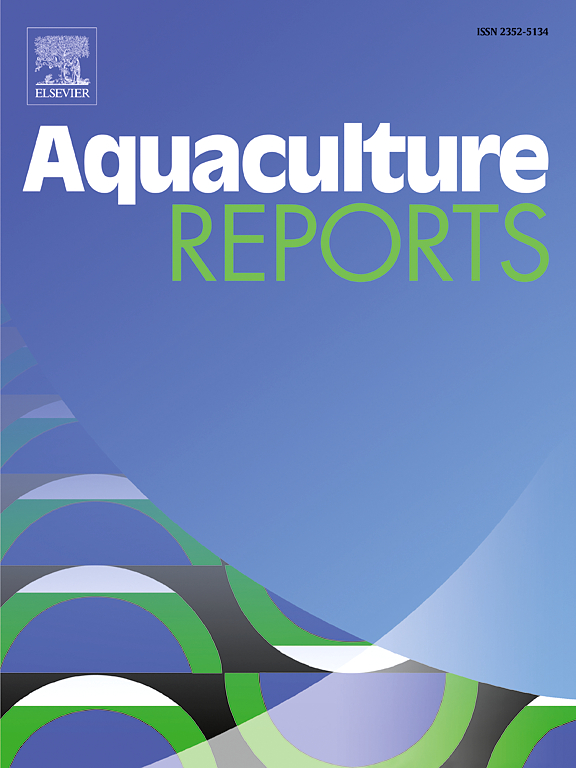Dietary bile acids alleviate dextran sulfate sodium-induced enteritis in juvenile leopard coral grouper (Plectropomus leopardus)
IF 3.2
2区 农林科学
Q1 FISHERIES
引用次数: 0
Abstract
Enteritis is a common disease in leopard coral grouper reared under intensive aquaculture conditions. We developed an enteritis model by feeding fish with 0.75 % dextran sulfate sodium (DSS) diet for one week, followed by a three-week period with diets containing graded bile acids levels (0 %, 0.15 %, 0.30 %, 0.45 %, 0.60 %). They were designated as DSSBA0, DSSBA15, DSSBA30, DSSBA45, and DSSBA60, with an control group received no DSS treatment. The results showed that growth performance was significantly impaired in the DSSBA0 group compared with the control group (P < 0.05), while it improved markedly as the bile acids levels increased (P < 0.05). Intestinal indices were significantly enhanced in the dietary bile acids groups, particularly in the DSSBA60 group (P < 0.05). Meanwhile, bile acids supplementation ameliorated DSS induced intestinal damage, including villus atrophy and reduced muscular layer thickness. Moreover, the gene expression of tight junction proteins (zo1, zo2, zo3, occludin and claudin-1) were significantly increased in higher bile acids treatment groups compared with the DSSBA0 group (P < 0.05). Furthermore, gene expression analysis indicated that pro-inflammatory cytokines (tnf-α, inf-γ, il-1β, il-6, il-8) were down-regulated, while the anti-inflammatory cytokine il-10 was up-regulated in the higher bile acids groups (DSSBA45 and DSSBA60) compared with the DSSBA0 group (P < 0.05). And the activities of enzymes associated with intestinal inflammation, including myeloperoxidase (MPO) and β-N-acetyl-D-glucosaminidase (NAG), were significantly reduced in the groups supplemented with bile acids. Microbial diversity analysis through 16S rRNA sequencing indicated that dietary bile acids notably increased the abundance of Firmicutes and Candidatus-Arthromitus. The above findings provide strong evidence that bile acids effectively alleviate enteritis in leopard coral grouper by preserving intestinal integrity, modulating inflammatory responses, and enhanced beneficial bacteria abundance. These findings provide a novel nutritional strategy for improving gut health in aquaculture, offering valuable insights for sustainable fish farming.
饲料中添加胆汁酸可缓解葡聚糖硫酸钠引起的豹珊瑚石斑鱼幼鱼肠炎
肠炎是在集约化养殖条件下饲养的豹珊瑚石斑鱼的常见疾病。我们用0.75 %葡聚糖硫酸钠(DSS)饲料喂养鱼一周,然后用含有不同胆汁酸水平(0 %、0.15 %、0.30 %、0.45 %、0.60 %)的饲料喂养鱼三周,建立了一个肠炎模型。分别编号为DSSBA0、DSSBA15、DSSBA30、DSSBA45、DSSBA60,对照组不进行dssss治疗。结果表明,与对照组相比,DSSBA0组的生长性能显著降低(P <; 0.05),随着胆汁酸水平的升高,生长性能显著改善(P <; 0.05)。饲粮胆汁酸组肠道指标显著提高,DSSBA60组尤其显著(P <; 0.05)。同时,补充胆汁酸可改善DSS诱导的肠道损伤,包括绒毛萎缩和肌肉层厚度减少。高胆汁酸处理组与DSSBA0组相比,紧密连接蛋白(zo1、zo2、zo3、occludin、claudin-1)基因表达量显著升高(P <; 0.05)。此外,基因表达分析显示,与DSSBA0组相比,高胆汁酸组(DSSBA45和DSSBA60)促炎细胞因子(tnf-α、inf-γ、il-1β、il-6、il-8)下调,抗炎细胞因子il-10上调(P <; 0.05)。胆汁酸组与肠道炎症相关的髓过氧化物酶(MPO)和β- n -乙酰- d -氨基葡萄糖酶(NAG)活性显著降低。通过16S rRNA测序的微生物多样性分析表明,饲料中添加胆汁酸显著增加了厚壁菌门和Candidatus-Arthromitus的丰度。上述研究结果有力地证明了胆汁酸能通过保持肠道完整性、调节炎症反应和增加有益菌丰度来有效缓解豹珊瑚石斑鱼肠炎。这些发现为改善水产养殖肠道健康提供了一种新的营养策略,为可持续鱼类养殖提供了有价值的见解。
本文章由计算机程序翻译,如有差异,请以英文原文为准。
求助全文
约1分钟内获得全文
求助全文
来源期刊

Aquaculture Reports
Agricultural and Biological Sciences-Animal Science and Zoology
CiteScore
5.90
自引率
8.10%
发文量
469
审稿时长
77 days
期刊介绍:
Aquaculture Reports will publish original research papers and reviews documenting outstanding science with a regional context and focus, answering the need for high quality information on novel species, systems and regions in emerging areas of aquaculture research and development, such as integrated multi-trophic aquaculture, urban aquaculture, ornamental, unfed aquaculture, offshore aquaculture and others. Papers having industry research as priority and encompassing product development research or current industry practice are encouraged.
 求助内容:
求助内容: 应助结果提醒方式:
应助结果提醒方式:


